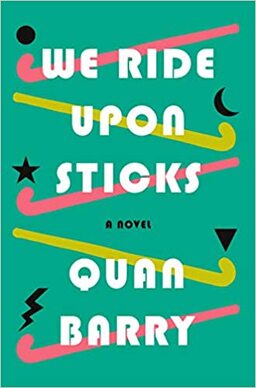|
A woman in my book club mentioned this title one evening when we were exchanging recommendations. I had never read a story about a field hockey team, but since it was based in Danvers, MA and ventured over to Salem, MA, two suburbs I visited during college, I thought I should give it a try. Everyone enjoys a good witch hunt, right? From the Monty Python skits to the 1993 classic Hocus Pocus, we’ve more or less bought into the hype. When I heard that one of my college roommates was from Salem, I too wanted a tour of Gallows Hill and the witch museum, both of which I got during the same Boston area visit that included a birthday party in Danvers.
I appreciated the subtle introduction of race, class and gender issues -- as opposed to the in your face slam you in the dunk tank approach in Parachutes, a book I recently used as an example of one that seems to work hard to squeeze in every buzz topic it can. Quan Barry’s approach is unique in that it layers a present “woke” viewpoint on top of the cultural norms of the times. It points out how awareness and discussions of difference and diversity were discretely starting to come about.
My one objection to the book is that there isn’t one character who didn’t rebel against her upbringing. I think that would have been nice to see, because not everyone ends up with a revolutionarily different life from the one they were first introduced to. However, I can see that that would have made the book far less interesting. When Barry’s field hockey team decides to make some kind of weird deal with the devil in order to win States, they begin acting out with insane pranks and emotional outbursts that, in the end, they realize was really their way of discovering their true selves. Some of it is just pure vandalism, like when the girls destroy someone’s van with their hockey sticks. Other times though, the act is something the reader can really get behind. After hearing what it’s like for Black girl at this high school, the reader is all for burning the stack of Huckberry Finns and only wishes she thought to do it herself. After hearing what it might be like to be a gay teenager, the reader wishes they had all just lived and let live. By the end of the book, the narrators finally agree that it’s time to ask the big question: “Back in August when we’d signed our names in Emilio, were we really believers in the powers of darkness, or were we simply manifesting our own destinies, writing the plotlines to our own stories by taking our individual lives by the reins?” (320) For sure, if nothing else, this book is a love song for American individualism and manages to report the successes of this mentality from about thirty years down the road. In some ways, it’s an optimistic view of how far we’ve come as Americans. It gets a little hard to follow at times, especially in the beginning when you’re introduced to the team. As I asked my friend who recommended it, “Do I have to remember the characters?” She replied, “Oh, you’ll figure it out. You’ll see.” She was right. This book definitely wins on characterization. If you’re a writer looking for new ideas for how to make your characters pop, definitely pick this one up. And if you’re a former high school student looking for a fun time warp into the past, consider this one. Maybe, like me, you never played field hockey. Maybe, like me, you might appreciate going along for the ride.
0 Comments
Leave a Reply. |
Author's Log
Here you will find a catalog of my writing and reflections. Archives
December 2022
|
